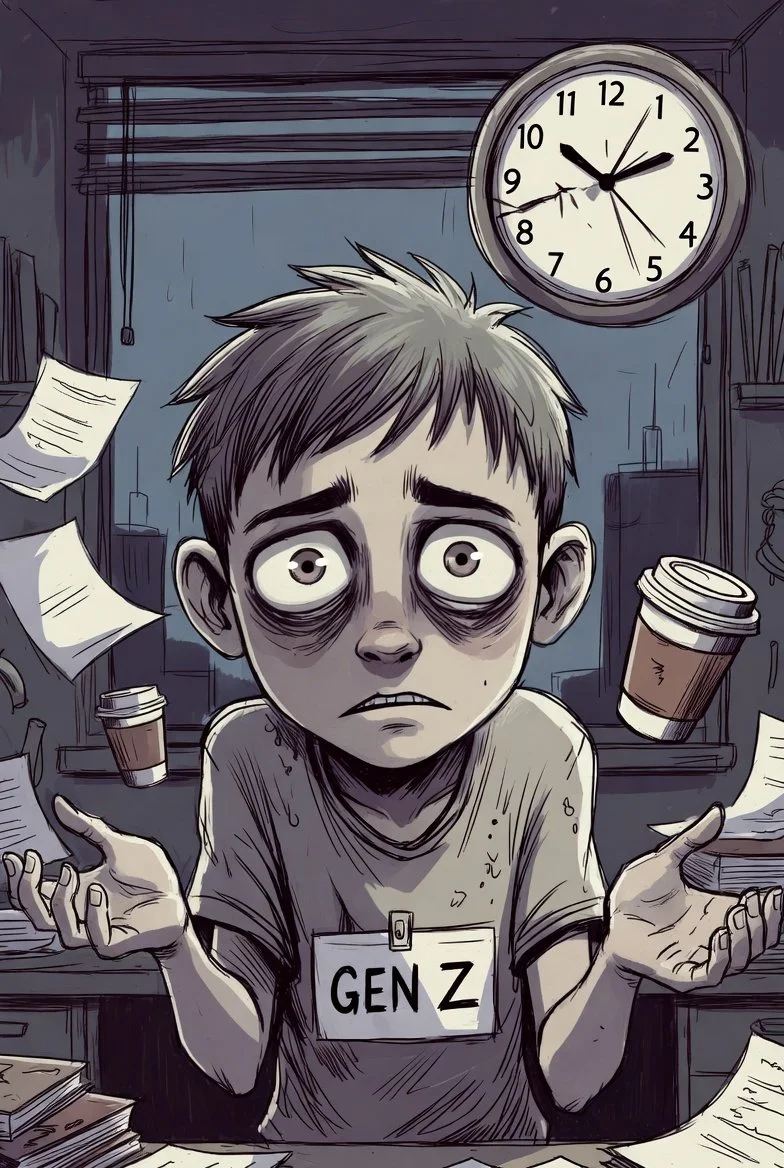Gen Z at Work: Hyper-Scrutinized and Undersupported
Every generation entering the workforce has unique hurdles. Gen Z is no exception. But let's be clear: right now, it’s darn hard to find a job.
Think of it as an “awful traffic jam.”
That’s how Michael Madowitz, the principal economist at the Roosevelt Institute, describes it, elaborating, “if you’re just out of college, you’re trying to merge into a freeway and nobody is letting you in…
Richard Yoon, an economics major at Columbia, told me that when his peers have multiple interviews for finance jobs, he asks if they’ve heard back. Their response? ‘You don’t understand. Like 19 of those 20 interviews were with bots.’”
But what may be more concerning is what these newbies experience when they finally land a job.
Hyper-scrutinized and undersupported?
For the past several years, employers have used "bossware" to track worker productivity. A New York Times investigation found that across professional fields and pay grades, employers are tracking keyboard use, movements, phone calls, and docking employees for time they perceive as “idle.”
(And it’s not just you, Gen Z.)
The result? Last year, job satisfaction for people under 25 was about 15 points lower than for people over 55. This unhappiness has become more pronounced with the pressure of AI, market uncertainty, return-to-office policies, layoffs, and a more strident attitude from executives demanding people get in line or get out.
(Btw, middle managers have had a significant satisfaction drop, too.)
The combination of having a hard time getting a job and then feeling like you need to hug the job you have can be deeply demoralizing.
The best organizations see things differently. They embrace a thriving culture and a People First approach as a matter of value and principle—not just strategy. They find it unprofessional to treat people badly when they have the upper hand.
My message to Gen Z is this: seek employment with companies that have a consistent commitment to a strong culture. (That’s tough, because everyone wants to work for them.) Alternatively, do what you can to be your own boss. And lastly, hang in there, because the pendulum will swing in ways we likely can’t see yet.
Being hyper-scrutinized and undersupported is not a sustainable strategy—for an organization or an individual.
After all, it’s always people that make things, including AI, work.
(Until I guess robots fully take over.)
Think Big, Start Small, Act Now,
- Lorne
Garrett’s View: This is why we encourage and discuss how imperative People First leadership and culture are. It’s so lucky to be part of that mindset. However, we’ve all still had to “get in line, or get out,” and muster through degrees of scrutiny and lack of support. It’s equally unsustainable to feel like the job search is “futile.” The new Gen Z saying cannot become, “when the going gets tough, at least there’s OnlyFans.”
- Garrett
AI Response: While the blog rightly highlights the "awful traffic jam" for Gen Z job seekers, the statistics are even starker: the unemployment rate for workers aged 20-24 is nearly double the national average, and a 2023 survey revealed that 45% of recent graduates feel their job search is futile. Once employed, the hyper-scrutiny is quantifiable, with global use of bossware having increased by over 50% since 2020, contributing to a dramatic 15-point satisfaction gap between workers under and over 25. This underscores that being hyper-scrutinized and undersupported isn't just demoralizing—it's a failed organizational strategy that risks alienating the very talent needed to power the future, AI-driven or not.
Search Blog Posts:
Categories
Month
- February 2026
- January 2026
- December 2025
- November 2025
- October 2025
- September 2025
- August 2025
- July 2025
- June 2025
- May 2025
- April 2025
- March 2025
- February 2025
- January 2025
- December 2024
- November 2024
- October 2024
- September 2024
- August 2024
- July 2024
- June 2024
- May 2024
- April 2024
- March 2024
- February 2024
- January 2024
- December 2023
- November 2023
- October 2023
- September 2023
- August 2023
- July 2023
- June 2023
- May 2023
- April 2023
- March 2023
- February 2023
- January 2023
- December 2022
- November 2022
- October 2022
- September 2022
- August 2022
- July 2022
- June 2022
- May 2022
- April 2022
- March 2022
- February 2022
- January 2022
- December 2021
- November 2021
- October 2021
- September 2021
- August 2021
- July 2021
- June 2021
- May 2021
- April 2021
- March 2021
- February 2021
- January 2021
- December 2020
- November 2020
- October 2020
- September 2020
- August 2020
- July 2020
- June 2020
- May 2020
- April 2020
- March 2020
- February 2020
- January 2020
- December 2019
- November 2019
- October 2019
- September 2019

